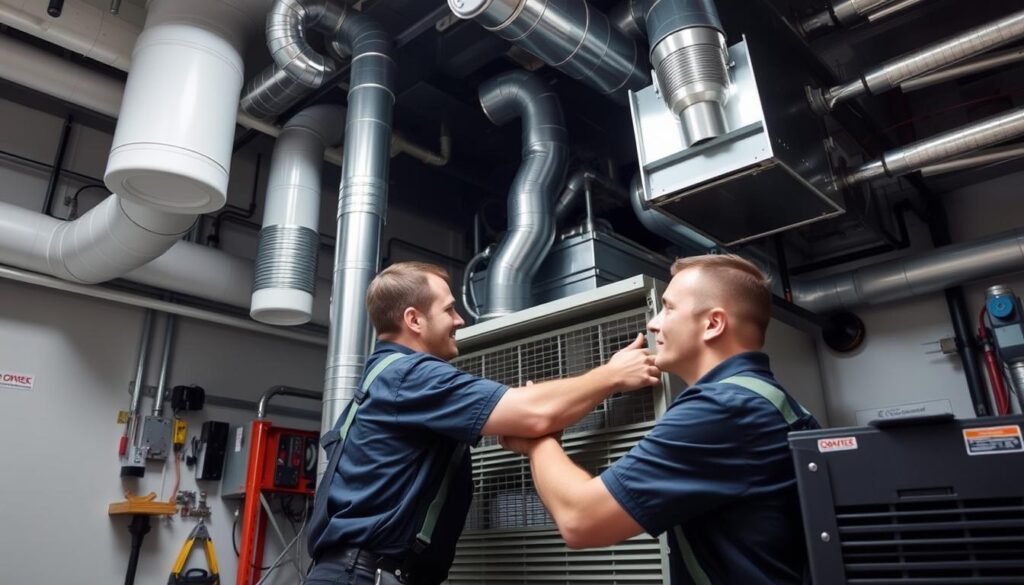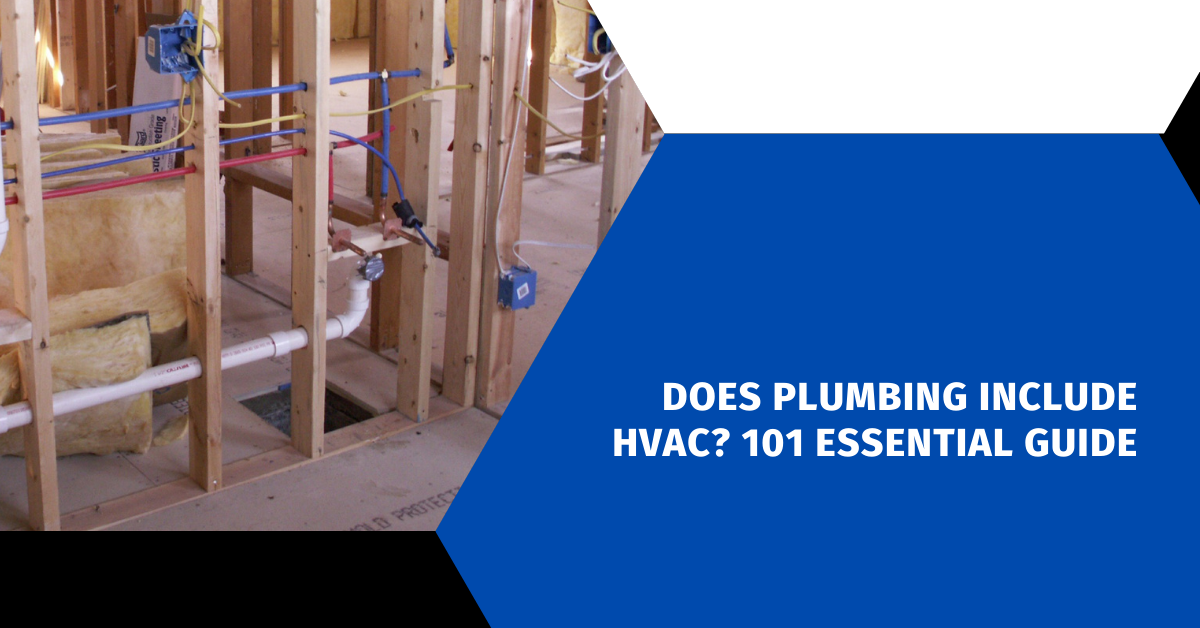Affiliate Disclosure
HVAC Guide Guys is a participant in the Amazon Services LLC Associates Program, an affiliate advertising program designed to provide a means for sites to earn advertising fees by advertising and linking to Amazon.
Does Plumbing Include HVAC? Keeping your home comfortable and working right involves two key systems: plumbing and HVAC (Heating, Ventilation, and Air Conditioning). These systems work together but have their own jobs and need their own skills for fixing and upkeep. This guide will show you how plumbing and HVAC are different, helping you see their unique roles in your home.
“The way to get started is to quit talking and begin doing.” – Walt Disney

Key Takeaways
- Plumbing and HVAC are separate home systems with distinct functions and requirements.
- Plumbing deals with the supply, distribution, and management of water and waste, while HVAC focuses on heating, cooling, and ventilation.
- Both systems require specialized training and licensing for professionals to ensure proper installation, maintenance, and repair.
- Understanding the differences between plumbing and HVAC can help you make informed decisions about your home’s infrastructure and maintenance needs.
- Advances in technology have led to increased integration and overlap between plumbing and HVAC systems, requiring a comprehensive approach to home system management.
Table of Contents
Understanding the Distinction Between Plumbing and HVAC Systems
Knowing the difference between plumbing and HVAC systems is key. These areas have their own parts, roles, and rules for who can work on them.
The Basic Components of Home Systems
Home systems have three main parts: electrical, plumbing, and HVAC. Plumbing includes water lines, drainage, and fixtures like sinks and toilets. HVAC has furnaces, air conditioners, and ducts for air.
Primary Functions and Purposes
Plumbing deals with water and waste, keeping it clean and flowing right. HVAC controls temperature and air quality, making homes comfy and saving energy.
Professional Licensing Requirements
Plumbers and HVAC techs need different licenses and training. Plumbers learn for 3-5 years and 8,000 hours to become journeymen. HVAC techs have less strict rules, changing by state.
“Hiring professional contractors who are licensed and bonded is crucial for maintaining and repairing complex plumbing and HVAC systems.”
It’s important to know the differences between home systems, plumbing components, and HVAC components. This helps when figuring out licensing requirements for home projects.
Explore Our HVAC Shop
Looking for top-rated HVAC tools, parts, and accessories? Visit our shop and find the perfect solution for your needs.
Visit the ShopDoes Plumbing Include HVAC? Key Differences Explained
Many homeowners are unsure about the difference between plumbing and HVAC systems. These two fields are related but distinct. They have their own parts, functions, and professional needs.
Plumbing deals with water and waste in a home. It includes pipes, faucets, sinks, toilets, and water heaters. Plumbers make sure water flows right and waste is handled properly.
HVAC systems control a building’s temperature, humidity, and air quality. They include furnaces, air conditioners, and ductwork. HVAC techs install, fix, and maintain these systems for comfort.
Plumbing and HVAC sometimes overlap, like with water heaters. But they are mostly separate trades. Each requires its own licenses, certifications, and knowledge.
Knowing the difference between plumbing and HVAC is key for homeowners. It helps them choose the right services for their needs.
In short, plumbing and HVAC are different fields. Plumbing handles water and waste, while HVAC controls temperature and air. Understanding these differences helps homeowners make better choices for their homes.
The Core Components of Plumbing Systems
Plumbing systems are vital for your home’s health, comfort, and safety. They consist of key parts that work together. These parts ensure clean water and proper drainage. Knowing about these components helps you understand their importance.
Water Supply and Distribution
The water supply starts with the main line from the city or well. It has a water meter and shut-off valve. These allow you to track water use and control flow.
Supply pipes then carry water to different parts of your home. This includes toilets, sinks, showers, and washing machines.
Drainage and Waste Management
Used water flows out through drainage systems. These systems use gravity to move wastewater. They include pipes, traps, and vents.
They lead wastewater to the sewer or septic system. This keeps sewer gases out of your home and ensures waste is disposed of properly.
Fixture Installation and Maintenance
Plumbing fixtures like toilets and faucets are crucial. They need to be installed correctly and maintained regularly. This keeps them working well for a long time.
Hiring licensed plumbers for these tasks is important. It helps keep your home’s plumbing systems in good shape.
Explore Our HVAC Shop
Looking for top-rated HVAC tools, parts, and accessories? Visit our shop and find the perfect solution for your needs.
Visit the ShopEssential Elements of HVAC Systems
Heating, ventilation, and air conditioning (HVAC) systems keep homes comfortable and energy-efficient. They have many parts that work together. It’s important for homeowners and professionals to know about these parts.
At the center of an HVAC system are the heating and cooling parts. This includes furnaces, boilers, or heat pumps for heat, and air conditioners for cooling. Thermostats, air filters, and ductwork also play key roles. They help control the air’s temperature, humidity, and quality.
The efficiency of an HVAC system is measured by AFUE for heat and SEER for cooling. Keeping these systems maintained is key. This includes changing air filters and cleaning ducts to save energy.
Ventilation is also vital. It brings in fresh air and takes out stale air. This improves indoor air quality, reducing health risks and enhancing well-being.
For homeowners, facility managers, or HVAC experts, knowing about these systems is essential. It helps keep indoor spaces comfortable, energy-efficient, and healthy.
| HVAC Component | Function |
|---|---|
| Furnace | Generates heat for the home |
| Air Conditioner | Cools and dehumidifies the air |
| Thermostat | Regulates temperature and controls the HVAC system |
| Air Filter | Removes dust, pollen, and other contaminants from the air |
| Ductwork | Distributes the conditioned air throughout the home |
Knowing about HVAC system components helps meet heating, cooling, and ventilation needs. It ensures a comfortable and healthy indoor space.
Where Plumbing and HVAC Systems Intersect
Keeping your home comfortable and efficient is key. Plumbing and HVAC systems play a big role. They often work together, sharing important parts and maintenance tasks.
Common Integration Points
Water heaters are a key spot where plumbing and HVAC meet. They need skills from both fields, handling water and heat. Radiant floor heating also combines both, using water pipes to spread heat around the house.
Shared Infrastructure Considerations
Both systems use the same pipes for hydronic heating. They also share condensate drains from air conditioning units. It’s vital to install and maintain these parts well for both systems to work right.
Maintenance Overlap Areas
Plumbing and HVAC often need the same maintenance. Tasks like checking water heaters, fixing humidity issues, and improving air quality need both plumbers and HVAC techs. Working together helps keep your home systems running smoothly.

Knowing how plumbing and HVAC systems work together is important. It helps homeowners and pros plan and care for their water heaters and radiant heating systems. This leads to better comfort, efficiency, and savings.
Explore Our HVAC Shop
Looking for top-rated HVAC tools, parts, and accessories? Visit our shop and find the perfect solution for your needs.
Visit the ShopProfessional Services and Expertise Requirements
Home systems like plumbing and HVAC need different skills. HVAC technicians work on heating, cooling, and air systems. Licensed plumbers handle water, drainage, and fixtures.
Both jobs need professional certifications and constant learning. This ensures these systems work well and safely. Most experts focus on one area because of its complexity.
| Profession | Key Responsibilities | Required Certifications |
|---|---|---|
| HVAC Technician |
|
|
| Licensed Plumber |
|
|
Choosing the right professionals for your home’s systems is key. They ensure your comfort, health, and safety. This is crucial for your home’s long-term well-being.
“Proper maintenance and care of HVAC and plumbing systems are crucial for their longevity and efficiency. Homeowners should rely on the expertise of certified professionals to ensure their systems function at their best.”
– Raj Srinivas, Mechanical Engineer with over 25 years of experience in building systems
Installation and Maintenance Considerations
Proper installation and regular maintenance are key for both HVAC and plumbing systems in your home. For HVAC maintenance, experts suggest bi-annual check-ups, filter changes, and thorough cleaning. This ensures your system works efficiently. Plumbing needs annual inspections and quick action on any leaks.
Regular Service Schedules
Keeping your home’s systems in top shape requires a consistent maintenance schedule. For HVAC systems, this means:
- Bi-annual check-ups and tune-ups
- Replacing air filters every 1-3 months
- Cleaning coils and other components regularly
- Lubricating moving parts as needed
For plumbing, annual inspections and quick plumbing repairs are key. This helps catch and fix problems before they get worse.
Emergency Repair Protocols
Emergency response for HVAC and plumbing systems can vary. Plumbing emergencies often need immediate water shutoff to prevent damage. HVAC emergencies might require shutting down the whole system to avoid further problems.
Cost Comparisons
Maintenance and repair costs for home systems can be quite different. HVAC installations and major repairs are often pricier than plumbing. However, both need big investments. System size, age, and complexity affect home system costs.
Regular servicing can prevent expensive breakdowns and extend your systems’ life. This saves you money over time.

Explore Our HVAC Shop
Looking for top-rated HVAC tools, parts, and accessories? Visit our shop and find the perfect solution for your needs.
Visit the ShopModern Integration Trends in Home Systems
Smart home technology is getting better, and plumbing and HVAC systems are now part of it. These systems make homes more energy-efficient and easier to manage. They also make life more convenient.
Smart thermostats are becoming popular. They control heating and cooling and can be set from anywhere. This helps save energy and lower bills. Water leak detectors also work with smart homes, sending alerts and letting you stop water leaks remotely.
Heat pump water heaters are another trend. They do the job of both plumbing and HVAC, saving energy. As people want to live more sustainably, these systems are in demand.
Smart home tech is changing how we handle our homes. It makes homes more energy-efficient and convenient. It’s a great choice for today’s homes.
| Integrated System | Benefits |
|---|---|
| Smart Thermostats | Remote monitoring and control, energy optimization |
| Water Leak Detectors | Instant alerts, remote shut-off capabilities |
| Heat Pump Water Heaters | Dual heating and cooling, enhanced energy efficiency |
“The integration of smart home technology with plumbing and HVAC systems is transforming the way we manage our homes.”
Conclusion
Plumbing and HVAC are two different systems that are vital for your home’s comfort and efficiency. Knowing how they work together helps you make better choices for upkeep and upgrades. As technology gets better, these systems will likely work together even more, making your life easier.
Keeping your home in good shape means regular check-ups for both plumbing and HVAC. Staying current with new trends in system integration can also help. This way, you can make your home more efficient and functional.
Understanding the importance of these systems and working with experts is key. This ensures your plumbing and HVAC work well together. It brings you comfort, convenience, and saves money. Investing in your home’s systems is a wise choice for a better life.
Explore Our HVAC Shop
Looking for top-rated HVAC tools, parts, and accessories? Visit our shop and find the perfect solution for your needs.
Visit the Shop
